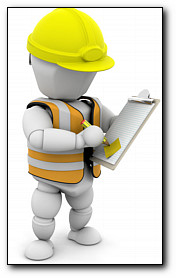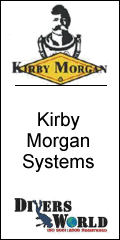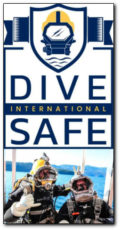Surviving a Ministry of Labour Diving Inspection (PART 1)
By CADC Admin ~ April 4th, 2019. Filed under: EDUCATION, Latest Diving News, Standards and Regulations.
“Good morning, I’m from the government and I’m here to help you.” The inspector from the Provincial Labour or Workman’s Compensation Board and the way he or she helps you, is by conducting an inspection or investigation of your diving operation and issuing orders, tickets or charges for the contraventions that are found.
 I was one of these “helpers” for over 20 years and was involved in hundreds of diving inspections, accident/fatality investigations, and employee complaint reviews. In this position, I learned what diving companies should do to be prepared for an inspection and much more importantly, to improve and organize their diving safety and health programs.
I was one of these “helpers” for over 20 years and was involved in hundreds of diving inspections, accident/fatality investigations, and employee complaint reviews. In this position, I learned what diving companies should do to be prepared for an inspection and much more importantly, to improve and organize their diving safety and health programs.
The primary responsibility of the Government’s Occupational Health & Safety Program is to develop and enforce health & Safety regulations that protect workers in the workplace. It has mandatory power to audit organizations for compliance of the safety standards and issue orders that may lead to penalties or prosecutions. Their inspectors conduct workplace inspections to ensure that employers are complying with the regulations and providing a safe and healthy workplace.
An audit carried out by compliance and safety officer can be a tedious and stressful experience for employers and site supervisors since the inspector is empowered to initiate penalties on those who are in violation of the regulation.
We must understand who has jurisdiction over the workplace when diving operations are involved. Canada’s health & safety legislation is complex and varies by jurisdiction. In most cases, the Canadian Constitution gives jurisdiction for worker health & safety to the provinces. However, in the case where workers are directly employed by the Canadian Government or those that work in interprovincial utilities, communications or transportation industries, the Federal Health & Safety Regulation applies. On-duty military personnel and native band members who are working on a reservation are exempt from both.
We must also be fully aware of the possible consequences of noncompliance. The maximum penalties in Ontario for an individual (worker/supervisor) in contravention of a regulation or an order is $25,000.00 per charge and/or imprisonment for up to 12 months or both, and for a corporation, $500,000.00 per charge. The director/s of corp. may also be charged. In the case of a worker fatality. Charges may also be laid under Bill C-45 of the Federal Criminal Act and result in imprisonment.
Preparation: Generally, an employer who takes proactive action (and the associated pains) to adhere to mandated requirements will fare much better during such inspections. The ultimate responsibility for worker health & safety lies with the employer and is shared by the diving supervisor and in some case the owner/client. A little known fact for many employers is that compliance officers normally research the history of a worksite before an inspection. Therefore it pays to work with the inspectors and answer questions fully and honestly, rather than adopt stalling tactics. Actions like disallowing entry to a workplace, to buy time, can turn out to be counterproductive in the end. Every diving operation is unique; no universal formula can be prescribed for negotiating an audit unscathed. However, attention to some basic details can help immensely.
First, and most important is to practice “Due Diligence”. This means to take every reasonable precaution to protect the health & Safety of the workers. Having an effective health & safety program which lays down the policies, procedures and practices for protection against diving safety and health hazards helps to develop the proper mindset. A written program should be communicated to all employees. In order to ensure due diligence this program/plan must include sufficient precautions for the prevention of work related injuries or illnesses and ensure that a job safety analysis and job hazard analysis are conducted and fully understood by all.
The test for due diligence is; policies, practices & procedures • monitor & ensure effectiveness of policies & procedures • identify & communicate hazard information • review OHS Program elements for effectiveness • a discipline process • orientation training & supervision of workers • accident investigation & reporting.
A health & safety program/plan is critical to establishing due diligence. This will allow you to prove the elements of the program are in effect, working, and effective. Remember — the greater the risk the greater the need for specific policies, practices and other measures to control and mitigate hazards.
Second, is to have the correct documentation on hand and at the job site. This is important in order to provide a history of activities, provide evidence your health & safety program is working and your written policy and procedures are understood, and followed by workers.
Records at a diving operation should include;
| • Operations Plan
• Notice of Dive Operation (if req.) • Worker Orientation Records • Diver Logbook • Diver Medical Certification • Breathing Air/Gas Records • Accident Investigations • Other Notices to Authorities • Pertinent Regulations |
• Contingency Plan
• Diver/Supervisor Competency Records • Supervisor Logbook • First Aid & CPR Qualifications • Equip. Logbooks & Service Records • Reports of Meeting or Crew Talks • Job Site Inspection Reports • Disciplinary Actions |
Third, when the inspector arrives unannounced, he will (hopefully) request to speak with the Diving Supervisor and not interrupt the operation unless there is an immediate risk to health and safety. The initial meeting should be open and receptive, making sure that the inspector understands that the entire team wants to partner with him or her to keep all employees safe.
During the initial meeting, present any information requested: copies of operations and contingency plans, recordkeeping logs, training records, and safety programs. However, it is not recommended to give additional information than what’s asked for.
Many inspectors are greeted by irritated employers who spend the first part of the meeting trying to decide if a complaint was filed, even when being told the inspection is random. Regardless of whether the audit is random or sparked by an employee or anonymous complaint, having a productive and pleasant initial meeting will set the tone for the rest of the audit.
The bulk of the audit will be spent on a dive site tour. If possible, select the most knowledgeable people to participate. It’s also important to make sure that someone is taking the same pictures as the inspector and making detailed notes of what is discussed. This will help later if there are any orders written or actions required.
After the tour, the inspector may conduct private employee interviews. The goal of these interviews is to validate information received regarding training and safety conditions. Employees will also have a chance to voice any concerns. If given the chance, choose employees that are well-spoken and knowledgeable, such as area leads, safety team committee members, and others that can speak well on behalf of the company.
Fourth and last, if contraventions are cited and orders are left there will be an appeal period stated on the field visit form. It is imperative that if you feel that the orders are unjust, you use this option immediately. Remember the paper trail will follow. If orders are left that you feel are just, then correct them immediately while the inspector is there. He can then record the non-compliance correction at the time of the visit. If time compliance orders are left then ensure that you provide a statement of compliance as soon as possible to the inspector, as directed, and suggest a re-inspection of your operation for compliance validation.
A government inspection may be neither welcomed nor enjoyable. However, armed with an understanding of the process and the potential issues involved, along with the support of a Diving Health and Safety Specialist and appropriate consul when necessary, a company can survive any inspection and outcome.
Reprint of article in CADC magazine by
Bob Landry is founder of the Seneca College, Underwater Skills Program, The Canadian Underwater Training Centre and was acting Diving Program Coordinator for the Ontario Ministry of Labour for twenty-two years. Bob is the recent recipient of the Canadian Diving Industry’s “Lifetime Service Award and CSA “Award of Merit”.
Please address any queries or questions to rwlandry@sympatico.ca






